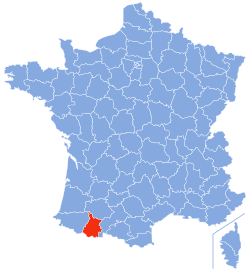Hautes-Pyrénées
Hautes-Pyrénées | |
|---|---|
 Prefecture building of the Hautes-Pyrénées department, in Tarbes | |
 Location of Hautes-Pyrénées in France | |
| Coordinates: 43°12′N 0°8′E / 43.200°N 0.133°E | |
| Country | France |
| Region | Occitanie |
| Département | 4 March 1790 |
| Prefecture | Tarbes |
| Subprefectures | Argelès-Gazost, Bagnères-de-Bigorre |
| Government | |
| • President | Michel Pélieu[1] |
| Area | |
| • Total | 4,464.0 km2 (1,723.6 sq mi) |
| Population (2014)[3] | |
| • Total | 228,950 |
| • Density | 51/km2 (130/sq mi) |
| Demonym | Haut-Pyrénéens / Bigourdans |
| Time zone | UTC+1 (CET) |
| • Summer (DST) | UTC+2 (CEST) |
| ISO 3166 code | FR-65 |
| Arrondissements | 3 |
| Cantons | 17 |
| Communes | 470 |
| Website | www.hautespyrenees.fr |
Hautes-Pyrénées (Occitan: Nauts Pirenèus / Hauts Pirenèus) is a department in the southwest of France. It is part of the Occitanie region and its main city is Tarbes.
History
[change | change source]Hautes-Pyrénées is one of the original 83 departments created during the French Revolution on 4 March 1790. It was created with parts of the former province of Gascony; these parts were the old province of Bigorre and the Pays des Quatre-Vallées.[4]
Geography
[change | change source]Hautes-Pyrénées has an area of 4,464 km2 (1,724 sq mi), or 0.81% of the country.[5] It is part of the Occitanie region and has two small territorial exclaves—a remnant from the Middle Ages—located within the neighboring département of Pyrénées-Atlantiques.
The department is surrounded by 2 regions and 3 departments:
- Occitanie
- Gers to the north
- Haute-Garonne to the east
- Nouvelle-Aquitaine
- Pyrénées-Atlantiques to the west
and by Spain (the province of Huesca) to the south.

Three natural regions can be distinguished in the department.[5]
The Pyrénées, along the border with Spain, cover the southern half of the department, with 66% of the department. They form a natural barrier between France and Spain. More than 30 mountains here are over 3,000 m (9,800 ft) high.
The Pic Vignemale (42°46′26″N 0°8′51″E / 42.77389°N 0.14750°E), at 3,299 m (10,823 ft), is the highest point of the department; it is on the border with Spain.[6] The Vignemale is in the Pyrénées National Park.
The second region of the Hautes-Pyrénées, with 17% of the territory, consists of chains low hills.
The third region, in the northern part of the department, is the plain of the Adour river and consists of largely flat agricultural land.
The main river of the department is the Adour river that flows through the cities of Tarbes and Bagnères-de-Bigorre. Other rivers are the Gave de Pau and the Neste.
Hautes-Pyrénées has two small territorial exclaves—a remnant from the Middle Ages—within the neighboring département of Pyrénées-Atlantiques.
Climate
[change | change source]The climate of the department is an oceanic climate with relatively hot summers, mild winters and abundant rainfall, Cfb in the Köppen climate classification.
The average amount of precipitation for the year in Lourdes is 1,005.8 mm (39.6 in). The month with the most precipitation on average is November with 109.2 mm (4.3 in) of precipitation. The month with the least precipitation on average is July with an average of 50.8 mm (2.0 in).[7]
The average temperature for the year in Lourdes is 11.8 °C (53.2 °F). The warmest month, on average, is July with an average temperature of 18.9 °C (66.0 °F). The coolest month on average is January, with an average temperature of 5 °C (41 °F).
| Climate data for Tarbes, France (altitude 360m, 1981–2010) (Source: Météo-France, Infoclimat.fr) | |||||||||||||
|---|---|---|---|---|---|---|---|---|---|---|---|---|---|
| Month | Jan | Feb | Mar | Apr | May | Jun | Jul | Aug | Sep | Oct | Nov | Dec | Year |
| Average high °C (°F) | 10.3 (50.5) |
11.3 (52.3) |
14.2 (57.6) |
15.8 (60.4) |
19.5 (67.1) |
22.8 (73.0) |
25.1 (77.2) |
25.2 (77.4) |
22.8 (73.0) |
19.0 (66.2) |
13.7 (56.7) |
11.0 (51.8) |
17.6 (63.7) |
| Average low °C (°F) | 1.0 (33.8) |
1.5 (34.7) |
3.7 (38.7) |
5.6 (42.1) |
9.5 (49.1) |
12.8 (55.0) |
14.9 (58.8) |
14.9 (58.8) |
11.9 (53.4) |
8.7 (47.7) |
4.3 (39.7) |
1.8 (35.2) |
7.6 (45.7) |
| Average precipitation mm (inches) | 95.0 (3.74) |
81.1 (3.19) |
87.0 (3.43) |
111.7 (4.40) |
111.6 (4.39) |
78.0 (3.07) |
56.0 (2.20) |
68.1 (2.68) |
71.6 (2.82) |
88.1 (3.47) |
102.5 (4.04) |
96.7 (3.81) |
1,047.4 (41.24) |
| Average precipitation days (≥ 1.0 mm) | 11 | 9 | 10 | 13 | 13 | 10 | 7 | 9 | 9 | 11 | 10 | 10 | 120 |
| Mean monthly sunshine hours | 118 | 129 | 169 | 170 | 189 | 198 | 205 | 206 | 190 | 151 | 117 | 109 | 1,951 |
| Source 1: climat.meteofrance.com[8] | |||||||||||||
| Source 2: infoclimat.fr[9] | |||||||||||||
Administration
[change | change source]The département is managed by the Departamental Council of the Haute-Garonne in Tarbes. The Hautes-Pyrénées is part of the region of Occitanie.
Administrative divisions
[change | change source]There are 3 arrondissements (districts), 17 cantons and 470 communes (municipalities) in the Hautes-Pyrénées.[10]
| INSEE code |
Arrondissement | capital | Population[11] (2014) |
Area[12] (km²) |
Density (Inh./km²) |
Communes |
|---|---|---|---|---|---|---|
| 651 | Argelès-Gazost | Argelès-Gazost | 38,813 | 1,300.2 | 29.9 | 87 |
| 652 | Bagnères-de-Bigorre | Bagnères-de-Bigorre | 46,384 | 1,675.7 | 27.7 | 171 |
| 653 | Tarbes | Tarbes | 143,753 | 1,488.1 | 96.6 | 212 |
The following is a list of the 17 cantons of the Hautes-Pyrénées department, following the French canton reorganisation which came into effect in March 2015:[13]
- Aureilhan (6501)
- Bordères-sur-l'Échez (6502)
- Les Coteaux (6503)
- La Haute-Bigorre (6504)
- Lourdes-1 (6505)
- Lourdes-2 (6506)
- Moyen Adour (6507)
- Neste, Aure et Louron (6508)
- Ossun (6509)
- Tarbes-1 (6510)
- Tarbes-2 (6511)
- Tarbes-3 (6512)
- Val d'Adour-Rustan-Madiranais (6513)
- La Vallée de l'Arros et des Baïses (6514)
- La Vallée de la Barousse (6515)
- La Vallée des Gaves (6516)
- Vic-en-Bigorre (6517)
Population
[change | change source]The inhabitants of Hautes-Pyrénées are known, in French, as Haut-Pyrénéens (women: Haut-Pyrénéennes).[14] They are also known as the Bigourdans.
Hautes-Pyrénées has a population, in 2014, of 228,950,[3] for a population density of 51.3 inhabitants/km2. The arrondissement of Tarbes, with 143,753 inhabitants, is by far the largest. The other two, Argelès-Gazost and Bagnères-de-Bigorre, have respectively 38,813 and 46,384 inhabitants.[11]
The city with more people living in it is the capital, Tarbes (40,900), followed by Lourdes (14,361). The subprefectures of Argelès-Gazost and Bagnères-de-Bigorre have, respectively, 3,020 and 7,602 inhabitants.[11]
Evolution of the population in Hautes-Pyrénées

The cities with more than 4,000 inhabitants in the department are:

| City | Population[11] (2014) |
Arrondissement |
|---|---|---|
| Tarbes | 40,900 | Tarbes |
| Lourdes | 14,361 | Argelès-Gazost |
| Aureilhan | 7,879 | Tarbes |
| Bagnères-de-Bigorre | 7,602 | Bagnères-de-Bigorre |
| Lannemezan | 5,912 | Bagnères-de-Bigorre |
| Vic-en-Bigorre | 5,004 | Tarbes |
| Bordères-sur-l'Échez | 4,879 | Tarbes |
| Séméac | 4,803 | Tarbes |
| Juillan | 4,104 | Tarbes |
Gallery
[change | change source]-
Middle of Lake Bastan, shortly before sunset
Related pages
[change | change source]References
[change | change source]- ↑ "Le Président". Conseil Départemental des Hautes-Pyrénées. Archived from the original on 19 October 2016. Retrieved 20 October 2016.
- ↑ "Département des Hautes-Pyrénées (65) - Résumé statistique". Publications et statistiques pour la France ou les régions (in French). Institut national de la statistique et des études économiques - INSEE. Retrieved 20 October 2016.
- ↑ 3.0 3.1 "Populations légales 2014 des départements et des collectivités d'outre-mer" (in French). Institut national de la statistique et des études économiques - INSEE. Retrieved 29 January 2017.
- ↑ "Un peu d'Histoire" (in French). General Council of Hautes-Pyrénées. Archived from the original on 17 September 2013. Retrieved 5 November 2013.
- ↑ 5.0 5.1 "Géographie et Démographie" (in French). Préfet des Hautes-Pyrénées. 2011. Archived from the original on 4 March 2016. Retrieved 5 November 2013.
- ↑ "Pic Vignemale, France/Spain". Peakbagger.com. Retrieved 5 November 2013.
- ↑ "Lourdes, France - Köppen Climate Classification". Weatherbase. Retrieved 17 February 2017.
- ↑ "Climat en France - normales - Météo France - Tarbes".[permanent dead link]
- ↑ "Normales et records des stations météo de France - Infoclimat - Tarbes-Ossun-Lourdes".
- ↑ "Département des Hautes-Pyrénées (65)". Géographie administrative et d'étude (in French). Institut national de la statistique et des études économiques - INSEE. Retrieved 17 November 2017.
- ↑ 11.0 11.1 11.2 11.3 "Régions, départements, arrondissements, cantons et communes" (PDF). Populations légales 2014 (in French). Institut national de la statistique et des études économiques - INSEE. Retrieved 17 February 2017.
- ↑ "Département des Hautes-Pyrénées (65)". Comparateur de territoire (in French). Institut national de la statistique et des études économiques - INSEE. Retrieved 1 February 2017.
- ↑ "Décret n° 2014-242 du 25 février 2014 portant délimitation des cantons dans le département des Hautes-Pyrénées" (in French). Légifrance.gouv.fr. Retrieved 20 October 2016.
- ↑ "Hautes-Pyrénées (65)" (in French). habitants.fr. Retrieved 20 June 2014.
Other websites
[change | change source]- Departamental Council of Hautes-Pyrénées Archived 2018-09-06 at the Wayback Machine (in French)
- Tourism & culture in Hautes-Pyrenees
- Prefecture website Archived 2007-06-25 at the Wayback Machine (in French)
- Western Pyrenees National Park Archived 2011-02-04 at the Wayback Machine
- Photography Panoramics 360° website (in French)






